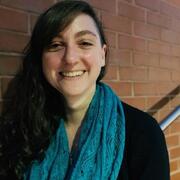
Rachel Leiken, MDiv '20, Multifaith Engagement Fellow at the Memorial Church, writes about deepening her commitment to social justice, community building, and university chaplaincy.
After the election in 2016, I spent a lot of time thinking about what I wanted to do in my professional life. I was working as a labor organizer at the time and, though I knew it was important work, it didn’t feel like the work I was being called to do. The unmasking of this country’s racism and the communal and personal outpouring of grief made me realize that I needed to be all in. I needed to even more deeply commit to the communities that I was already and wanted to be part of, and to figure out the work that I uniquely could do to fight for justice.
To understand what this might look like, I started thinking a lot about the concept of vocation and asking myself about the people whose work I admired the most. The same answer kept coming to mind: university chaplains. I had grown so much in college through my relationship with these awesome folks; at Brown University, there are five chaplains, and I was constantly inspired by the way they lived lives of deep practice, connection, and meaning rooted in their religious traditions. I also thought about how my own understanding of justice has always been rooted in my Judaism and has also been about working to build relationships with other religious, spiritual, and ethical communities. I thought about how both religious practice and activism were central to how I wanted to show up in the world.
Fast forward a few years — through Harvard Divinity School and working for two years at Brown alongside the chaplains I had been so grateful to get to know as a student — to this election. In the past few weeks, I have found myself asking similar questions about what it looks like both to be deeply involved in the work of justice and to have spaces to cultivate the inner strength that allows us to remain grounded amidst the chaos of the world.
I am so grateful to be the Multifaith Engagement Fellow at Harvard and Memorial Church, where I am getting to do both of these things and to think about what it looks like to build relationships across communities. As anxieties and fears about the pandemic and about what the future of this country will look like have mounted, I have gotten to learn from a number of Harvard’s incredible chaplains about the ways in which they are adapting to continue to accompany students in their journeys, even as those journeys look vastly different from what anyone could have imagined just a year ago.
One thing that has been particularly meaningful has been working with Rabbi Jenn Queen to put together a program that focuses on the religious, spiritual, and ethical practices that are sustaining folks. Sustaining Practices for Perilous Times, which kicked off this past Monday, is a weekly series that brings chaplains and students into conversation for a moment of grounding and to learn about the diversity of ways of creating and sustaining meaningful frameworks for life during these trying times.
Especially after the anxiety of the past weeks leading up to and waiting for the election results, and the continued uncertainty and immense work that needs to be done, spaces like this feel crucial. I invite you to join us for this series, Mondays from 5-5:30 pm throughout the rest of the term.
This piece appeared in the November 12, 2020 edition of "Practicing Hope," the daily newsletter of Harvard's Memorial Church. To subscribe, visit the Memorial Church Website.